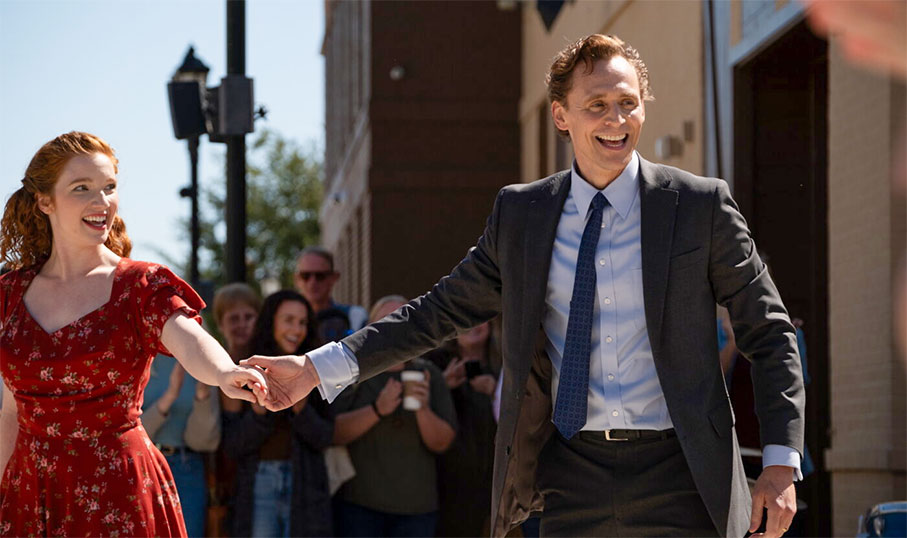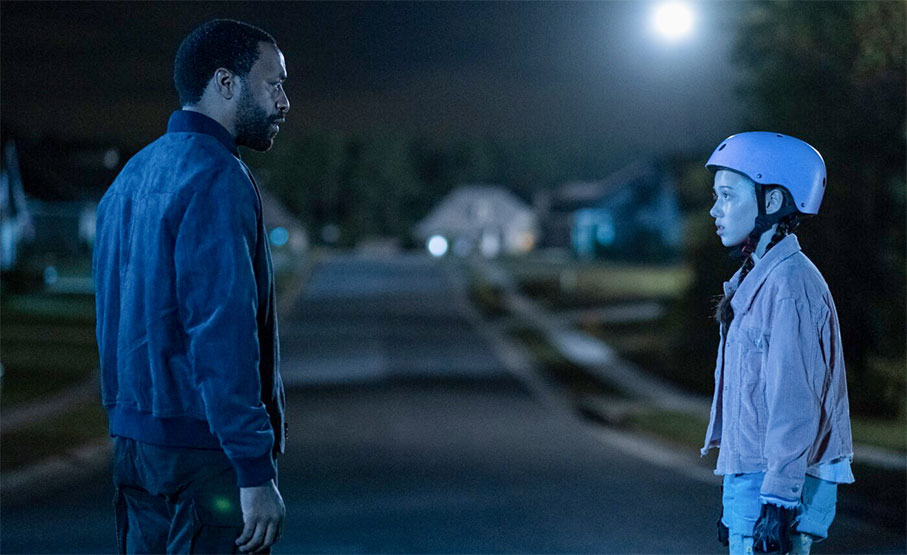| |
“I don’t necessarily think I have an internal universe like the one that’s on screen. I love the one that Stephen King designed. But if I did and it could truly be populated by my impressions of all of these people through my life, what an incredible place to visit that would be.” |
| |
Director, Mike Flanagan* |
One of the joys of writing for Outsider is sometimes taking pot luck on a film I’d not heard of released on a Blu-ray and having my socks knocked off by how good it was and frustrated that it had not crossed my path earlier. The best example is Hal Ashby’s extraordinary pre-Harold and Maude feature, The Landlord. It is extremely rare that I ever get the chance to go that cold into the cinema. There’s too much noise out there. Having said that, all I knew about The Life of Chuck was that Tom Hiddleston was in it (the poster of him sitting on a bench wasn’t exactly ‘must see’ marketing) and it was based on a novella by Stephen King which I had not read. A glowing paragraph review from a friend who celebrated its originality and heart and containing nothing about the film’s content, was all the impetus I needed.
Told in reverse, The Life of Chuck starts with Act Three: Thanks, Chuck. OK, I’ll bite. A series of natural disasters occur, the internet is lost (the first clue that we are not in our reality) and teacher Marty starts seeing billboards, skywriting and even TV test cards featuring accountant Chuck Krantz. Lex Luthor’s dream from Superman is a reality; the west coast of America has fallen into the ocean. People in the street are despondent, shuffling forward with no joy or purpose and neighbours talk about how the world might even be ending. Marty makes his way to his ex-wife Felicia’s house. As he arrives, the electricity goes down except for more brightly lit Chuck posters appearing in every window. In Felicia’s back garden, the two share a moment in awe at the glory of the Milky Way resplendent above them. Then the North Star blinks out of existence. OK, I think Chuck Krantz has something to do with this. We find him in hospital dying from a brain tumour…

Acts Two and One show us excerpts from Chuck’s life as an adult and child respectively. Chuck is an accountant, having been persuaded of the beauty of numbers by his grandfather Albie. As a child, with a one-on-one with a new, nervous teacher, he is moved by a Walt Whitman poem, able to see himself as containing multitudes, a whole universe created and nurtured by himself. His grandmother inspires him to dance and he’s further inspired by a dance teacher. As an adult, Chuck’s chance encounter with a street busker encourages him to embrace his life and take every chance offered to him. Any more detail would rob you of potent pleasures still to come. That is more than enough plot to be going on with.
I’m not sure if there was a method in the casting but on more than one occasion I thought, “That’s really smart, casting actors more well known for their young roles and now we see the effects of the decades on their shoulders.” One actress in particular set off such an ‘Aha!’ thrill of recognition, I smiled whenever she came on screen. Forever encased in her youth in the 80s in my own mind was Mia Sara and to see that face in her late fifties looking as beautiful as she did as an 18 year-old in Legend was a lovely surprise. Her husband Albie is played by the lightning rod of the original Star Wars, Mark Hamill. Again, like Sara, he plays the role of someone whose life has worn him down and grief and the bottle are all he has to sustain him. Four actors play Chuck (at seven, 11, 17 and 38) and each are convincing and heartfelt even if three of them inspired a rather naff poster for a film that must have given the marketing department a hernia or two. Hiddleston has the stand-out event to perform as Chuck but despite his character’s ubiquity, he doesn’t have a lot of screen time. The elements that make up his multitudes are also a fascinating choice of terrific actors.
You’ll have to watch a lot of movies to find a less than convincing Chiwetel Ejiofor performance. As teacher Marty, he’s the star of the first act (Act Three), navigating us through Chuck’s fracturing and dying mind, as confused as to what’s happening as I suspect the audience is. Although he doesn’t play a large role in Chuck’s childhood scenes, he is present throughout. We also wonder why he’s living in Chuck’s childhood house but those little mysteries are there to think about but are not vital to the narrative. And free from Nebula’s ‘blue face’ turn from Guardians of the Galaxy, is Karen Gillan as Marty’s ex-wife Felicia. I’ve been a fan since Steven Moffat’s Doctor Who episode, The Eleventh Hour, where she debuted as Matt Smith’s co-traveller. I mentioned Chuck’s grandparents who steer him through childhood. It’s always nice to see Matthew Lillard popping up as neighbour Gus, and then there’s the Joker’s main man, David Dastmalchian as Josh, a single father grieving over his wife leaving him. The director, Mike Flanagan, does a Hitchcock cameo at Chuck’s grandmother’s funeral and his wife appears in a pivotal scene. Kate Siegel plays Miss Richards, the idealistic teacher who opens up Chuck’s mind to the multitudes within him.

Director Flanagan also directed two of the better Stephen King adaptations, Gerald’s Game (which I’ve yet to see but site admin Slarek rated it as did critics in 2017) and Doctor Sleep, with Rose the Hat still infiltrating my nightmares (and dreams) now and again. If you cast Rebecca Ferguson as a soulless vampiric creature, you have the personification of ‘cognitive dissonance’, at least in my mind. Flanagan, as he did with both other adaptations, serves as his own editor on The Life of Chuck which is fascinating to me. A good editor will arm the director with many different points of view, widening their perspective on the material shot. I know James Cameron does the same thing but he works with other editors. The Cohen brothers also serve as their own editors but there’s two of them. To be the sole director and its sole editor on a mainstream film is very unusual.
If I had to find cracks in this vastly affecting and affirming drama, I’d say that I would have liked to have seem Marty interact more with Chuck as a child in school to give validity to his starring presence in the first act (Act Three). And while I have no issue with voice-overs in movies per se, the smooth-as-honey American drawl of Nick Offerman, while superbly delivered, is way, way too much of a good thing. I know it’s sometimes more of an effort to impart information visually, something a narrator can say in a few words, but in this case it felt over the top and nervously on the edge of an audio book. I didn’t dislike it at all. I just wanted the movie beneath it to assert itself a little more or been given a chance to do so while Nick took a longer breath.
As an antidote to the soulless conveyor belt of over-budgeted but under-performing summer blockbusters, The Life of Chuck is charming, full of heart and with enough mystery, magic and soul to satisfy the most jaded palette.
|